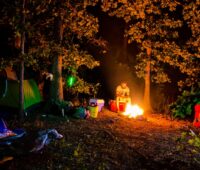
Alastair Borthwick became known as a man of many passions, but two stand out and face the test of time. He joined, and chronicled, Scotland’s hiking movement in the early 20th century. And he brought an easy, conversationalist style to broadcasting, later to be repeated in his documentary activity. Borthwick (17 February 1913 – 25 September 2003) could bring to life the characters – hikers and berry pickers of the Scottish highlands, but also the grimness of war.
The preferred life of Borthwick was one centered on creative activity. “I always believed the ideal life was to write a thousand words in the morning and catch a salmon in the afternoon,” Alastair Borthwick once said. Yet despite the middle-class sentiment, he would become the friend of tramps, berry pickers and common folk, who took to the hills of Scotland in search of freedom and meaning.
The experiences of hiking led to Always a Little Further (1939), a book that created another cult following. From then onward, Borthwick worked as a journalist, broadcaster and author, as well as historian, throughout a long creative career. Borthwick was versatile, taking over multiple roles, in a life that moved through several distinct stages.
The mountaineering chronicles in Always a Little Further eschew the exotic, and focus on the experiences of hikers and climbers, pushed into the outdoor hobby by mass unemployment in Glasgow and Clydebank. It was the array of notable characters that added to the appeal of the book as an outdoor classic. Hiking became a way of overcoming everyday troubles, for common folk suddenly with time on their hands and mountains on their doorstep. Borthwick once noted: “One cannot sweat and worry simultaneously.”
The West Highlands became the scene for that unusual crowd. Ken Wilson, the mountaineering historian, spoke of the movement as, “It was rather as if a group of Eastenders had suddenly decided to take up grouse-shooting or polo.” But Borthwick did not focus on the hiking or climbing as a sport – instead, taking time to describe the vivid characters. Behind the simple story of outdoor exploration, Borthwick chronicled a wider social change happening at the time.
Yet the stories were simple, sometimes comical, outlining encounters with tramps, Irish travelers and traders, and even hitch-hiking in a truck transporting a flock of dead sheep! The unusual subject matter of the book almost left it outside publishing, if it were not for T. S. Eliot to recognize the merits of the story.
Borthwick, however, was always on the track for a career in journalism. He was 16 when he became a “telephone boy” at the Glasgow Evening Herald, transcribing interviews from correspondents. Soon after that, he became a part of the newspaper’s small team, receiving several beats to oversee. He produced the Women’s Page, Children’s Page, Film Reviews, Readers’ Letters and Readers’ Queries, and Crossword Compiler, and his work often appeared on the front page. Later, in 1935, he had a brief stint at the Daily Mirror, getting fired soon after joining.
But the breakout for Borthwick was an interview with the BBC, where he casually mentioned his hiking interests to producer James Fergusson. Soon after that, Borthwick created a short broadcast piece on hiking. “I saw him in the studio treating the microphone like an old friend, chatting away, waving his arms about, and I knew this was how it was done,” said Fergusson.
Thus began the fame of his casual, informal style of broadcasting. “It just seemed the natural way to speak,” he said. “I couldn’t understand why everybody didn’t do it.”
But the Second World War brought Borthwick to another type of experience, far from the press or broadcasting world. After seeing action in North Africa and Europe, Borthwick wrote Battalion – A British Infantry Unit’s Actions from El Alamein to the Elbe, 1942-1945. Borthwick’s batallion saw ambushes, snipers, minefields and a tank trap. Once, Borthwick had to lead 600 men past German lines, with maps known to be inexact and faulty. But the years spent getting to know nature played their role, and Borthwick survived to write about the feat of intuitive navigation by nighttime, as well as luck. The events are further detailed in a history of the Seaforth battalion, which Borthwick wrote as part of his duties as veteran.
After the war, Borthwick went back to nature, this time as a farmer on the Island of Jura, where he moved with his wife in 1945. After spending seven years there, the family moved to the island of Islay. This movement marks the third stage of Borthwick’s career, where he continued with small broadcasts, as well as voicing documentaries. He adapted to television, bringing his talents to another broadcasting age.
Of his past in journalism, Borthwick said he had a way he wanted to be remembered: “He never broke a deadline, and was always printable.”














Leave a Reply
Be the First to Comment!
You must be logged in to post a comment.
You must be logged in to post a comment.